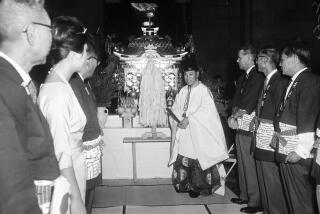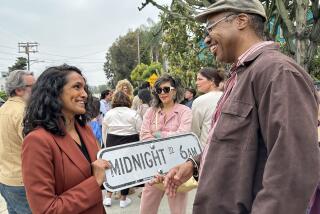Religious motto finds prominent homes
The way Jacquie Sullivan sees it, the motto âIn God We Trustâ is more about patriotism than religion.
So when the Bakersfield councilwoman, 68, heard on a Christian radio station in 2001 that protesters on the East Coast were trying to remove the phrase from public buildings, she considered it her civic duty to reverse the trend.
âI just shook my head in amazement when I heard,â she said. âI thought, if theyâre working to take it down, Iâll start working to put it up.â
Sullivan launched a nonprofit group, In God We Trust -- America, and began e-mailing informational packets to city clerks, with the help of a dozen volunteers and a tiny budget.
After years of controversy and support, the motto is now featured prominently in government buildings of nearly 30 California cities. Council members in Cypress voted Monday to add the phrase; Westminster mounted the words last month.
And so Sullivanâs small team has become another player in a long-standing feud between the mostly Christian groups that promote the presence of religious text or symbolism in public spaces and organizations, such as the American Civil Liberties Union, that advocate a secular state.
Some activists say the expression of a single faith on government property, such as Nativity scenes and exhibitions of the Ten Commandments, is unconstitutional and discriminatory.
âThe role for the government is to be benignly neutral,â said ACLU attorney Peter Eliasberg. âItâs not their job to be atheist, but also not to support religion generally, especially since itâs a divisive, intensely personal thing to people in this age of tremendous religious pluralism.â
But to others, expressions of faith reflect the American ideal of freedom of religion.
The two sides have clashed over several Southern California displays, including a cross on the Los Angeles County seal and a 29-foot-tall cross at Mt. Soledad Veterans Memorial in San Diego.
Los Angeles County supervisors decided to eliminate the cross from the seal in 2004 after the ACLU threatened legal action. The U.S. Supreme Court last year declined to hear a lawsuit to restore it.
The fate of the Mt. Soledad cross is in limbo in federal court following a lawsuit challenging a law signed by President Bush in 2006 that transferred the site of the cross from city to federal ownership.
Supporters said the use of Christian insignia reflects Christianityâs historical role in the nationâs development.
The cross on the county seal represented the San Gabriel Mission, built in 1771 by Spanish Franciscan friar Father Junipero Serra, said Supervisor Michael Antonovich. He said its removal amounted to rewriting history.
Sullivan said that her campaign represents all religions and that Bakersfieldâs Muslims and Sikhs mostly support the effort. Others like her insist that they encourage public displays from any faith but say they focus on defending Christian symbols because those draw the harshest backlash.
âThese cases say a lot about the encouragement of cultural literacy and the origins of the American law and public, and what the founders valued,â said Mike Johnson, senior legal counsel at the Alliance Defense Fund. âThereâs some kind of education purpose to it, a recognition of our history and heritage that transcends a religious purpose.â
According to a statement of purpose, the Washington, D.C.-based group advances âthe spread of the Gospel through the legal defense and advocacy of religious freedom.â
But at Americans United for Separation of Church and State, executive director Barry Lynn said those who support mingling religion with government have a dangerous motive: official favoritism for Christian citizens.
If the intention of groups such as Sullivanâs was educational, they would promote the E Pluribus Unum motto, Lynn said.
The ACLU has not filed any suits against the âIn God We Trustâ campaign. Congress voted to make it the national motto in 1956, and since then several groups have urged lawmakers to display the words on public buildings nationwide.
The back-and-forth over religious symbols in public life began escalating in the 1960s, said activists from both sides. According to advocates for government secularism, evangelical groups felt persecuted and threatened by an influx of immigrants and new faiths and sought to reestablish the dominance of Christianity.
âThey donât just want to remind people that Christianity is here; they want people to think that Christianity is in the No. 1 spot,â Lynn said.
But Johnson said Americans United and the ACLU stir up controversy because of an inexplicable, growing hostility toward Christianity.
âTheyâre a tiny minority of the American public, but they are unfortunately very well funded and very vocal,â Johnson said.
Either way, proponents of both causes say their struggle has a long way to go.
The stakes are high, said Richard Thompson, president of the Thomas More Law Center, which litigated to keep the Mt. Soledad cross.
âSymbols have always been used to teach the next generation, and if theyâre out of sight, out of mind, itâs just another way of removing their influence,â he said. âYou change the religious foundation of our nation, you change our nation.â
--
(BEGIN TEXT OF INFOBOX)
Public displays
These California cities have agreed to display âIn God We Trustâ in public.
Apple Valley
Artesia
Arvin
Bakersfield
California City
Carson
Compton
Cypress
Delano
Hawthorne
Kerman
Lodi
Maricopa
McFarland
Oakley
Oceanside
Paso Robles
Plymouth
Porterville
Ridgecrest
Shafter
Sonora
Taft
Tehachapi
Tulare
Victorville
Wasco
Westminster
Source: In God We Trust -- America
More to Read
Sign up for Essential California
The most important California stories and recommendations in your inbox every morning.
You may occasionally receive promotional content from the Los Angeles Times.











